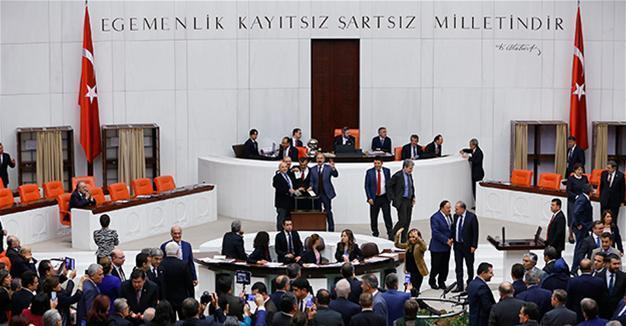Secret ballot debate grows as charter talks proceed
ANKARA

AA photo
Turkey’s parliament has approved the first two items of an 18-article constitutional amendment package to shift the current parliamentary system to an executive presidency by respective votes of 343 and 347 amid serious opposition criticism over government MPs’ violations of the requirement to vote secretly.
“The result of [the votes on] these two articles indicate that the proposal will be accepted by parliament by around 340-350 votes,” Justice Minister Bekir Bozdağ told private broadcaster A Haber on Jan. 11.
The first article approved on late Jan. 10 altered the ninth article of the Constitution – “the judicial power shall be exercised by independent courts on behalf of the Turkish Nation” – to read “independent and impartial courts.”
The second vote passed a motion to increase the number of the lawmakers in the 550-seat parliament to 600.
The first two votes showed that almost all MPs from the Justice and Development (AKP) and the Nationalist Movement Party (MHP) voted for the package, with the government saying it expected the entire package to receive a similar level of votes, which would thus bring the document to a referendum.
While Bozdağ stated confidence in future sessions, voting in the general assembly witnessed a heated debate on the “secret ballot” procedure, after ruling lawmakers sought to cast an open ballot during the voting session.
Even though Bozdağ said the current constitution stipulates that “the secret concealment of the vote,” Health Minister Recep Akdağ refused to vote secretly, drawing opprobrium from the opposition.
“I might have been violating the law. What’s it to you?” Akdağ told them on Jan. 10, prompting a brawl as opposition lawmakers accused Akdağ of violating the law.
The opposition argued that the AKP was making a special effort to prevent any defections from their party and that some lawmakers voted openly to exert pressure on other lawmakers that might be considering voting against the package.
In the past the parties used methods such as “voting without closing the cabin, collecting vote stamps or man-to-man marking.”
CHP: AKP violating constitutional rules
The main opposition Republican People’s Party (CHP) slammed ruling party lawmakers for casting their votes openly at the cost of breaching the constitution.
“Votes on constitutional [changes] should be secret according to the Constitution, but this provision has been violated in the Turkish Grand National Assembly,” said Çetin Osman Budak, deputy leader of the CHP, in a written statement on Jan. 11.
“During the voting, the deputies who voted openly were documented. There were 338 votes in favor, but at least 10-15 deputies were casting their votes openly. It should be annulled,” CHP Muğla lawmaker Süha Aldan added.
Answering the question about the discussion on the secret ballot, Bozdağ said the law stipulates the secrecy of the vote but did not mandate that MPs enter the cubicle to vote.
“A secret ballot does not mean you should go into the cabinet, close the curtain and vote. It means voting secretly. Nobody sees the stamp in your hand,” he said.
“The CHP is making a scene as if the secret ballot requires [MPs] to vote in the cabinet. They are filming trying to document the vote, violating the bylaw to prove it. As far as I see, there were three votes and all three of these votes were made by observing the rules of confidentiality,” Bozdağ said.
HDP: Vote needs to be taken to top court
In the meantime, the People’s Democracy Party (HDP) suggested that the vote that paved the way for the launching of debates on 18 articles of the package needed to be taken to the top court for annulment.
“In any case, the [vote on this] proposal must be taken to the Constitutional Court,” HDP deputy parliamentary group leader Filiz Kerestecioğlu told online news site Gazete Duvar on Jan. 11. “The ruling party intervened in the form of exerting domination over parliamentarians. This means a violation of the constitutional rule regarding secret ballots,” she said.
